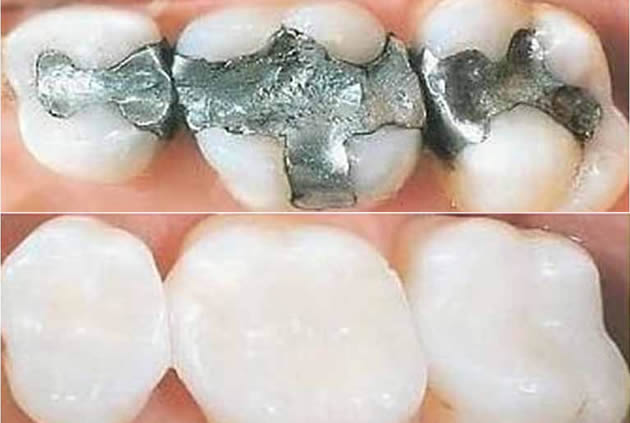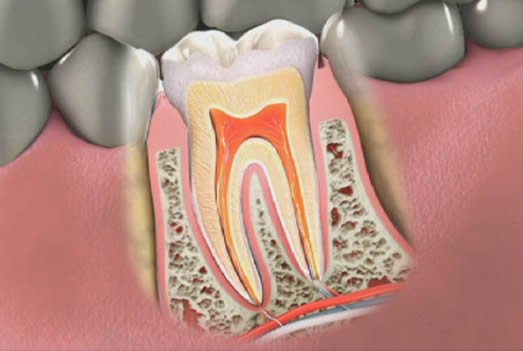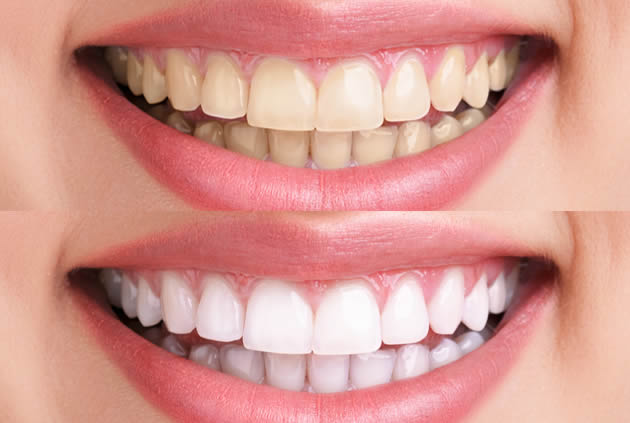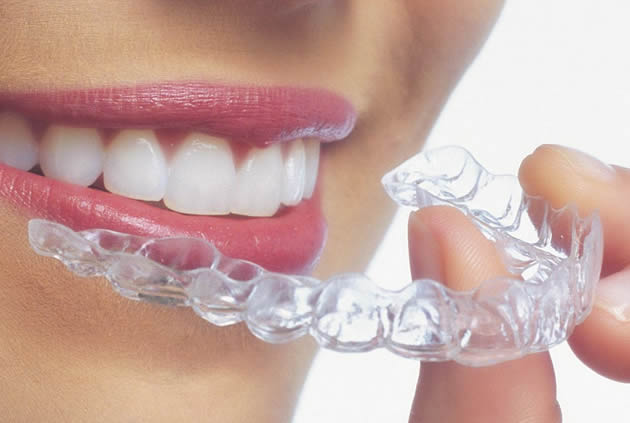
Dental implants can last a lifetime with proper care. Like natural teeth, dental implants require vigilant oral care to maintain their usefulness and prevent problems. Once the implant has fused to the jaw bone, it is important to follow some general guidelines to ensure the continued success of your dental implant and restoration.
A condition known as peri-implantitis is a common cause of implant failure. This occurs when an accumulation of plaque leads to damage of the tissues and infection of the bone around the implant. While the implant itself is not susceptible to decay, if plaque is not removed with thorough brushing and flossing at least twice per day the resulting periodontal disease can lead to implant failure.
Your dental professional may also recommend the use of additional oral hygiene products such as special brushes or oral irrigation devices to aid in the removal of food debris and plaque around the areas of the implant supported restorations. Your dentist or hygienist can assist in teaching you to utilize these devices to improve your implant care.
Regular dental visits and examinations are vital to detect and prevent any issues that may present problems for your dental implants. Expect to visit your dentist every 3 months for the first year after implant placement, and then every six months for the life of your implants. Your dentist will also provide special care instructions if your implants are being used to support a removable denture. It is important to know how to place and remove the appliance without causing damage to either the denture or your implant.
Avoid applying excessive pressure or eating hard foods that could cause damage to the restoration and implant area. If you suffer from conditions like teeth grinding or clenching, discuss with your dentist the option of being fitted for a night guard to prevent the problems these habits can cause your implants. Taking excellent care of your oral health will help to ensure years of dental implant success.
We look forward to seeing you in our Baltimore dental office

Are you getting a smile makeover? Do you have one or more missing teeth? Your cosmetic dentist will definitely want to replace those teeth during your smile makeover in order to prevent future problems. Issues may result from your teeth shifting to fill the empty spaces that can affect the overall shape of your face. One of the best and most desirable options for tooth replacement is dental implants.
Dental implants are the top-of-the-line choice for tooth replacement. They are the most like natural teeth in both form and in function. No one will know by looking at you that your tooth is an implant, and you might not even be able to tell it yourself when you’re eating! A dental implant is so secure, it can feel just like your natural tooth.
There are two main parts to a dental implant: the screw base and the tooth restoration. The screw-like base is typically made of titanium. This gives it incredible strength and longevity. The implant is placed directly into the bones of the jaw where it begins to function as a natural tooth root. Over time, oseointegration will occur and the implant will fuse with the bone. The tooth portion of the implant is created in a lab where dental artists are careful to replicate the surface texture and translucency of your natural teeth.
Dental implants can also be used to anchor dentures. Because they’re so strong, they give the dentures a stability that adhesives and suction can’t ever provide. Denture-wearers will never have to deal with embarrassing slipping or clacking again when dental implants are utilized with their dentures.
Consult your cosmetic dentist to see what role dental implants can play in your smile makeover. Begin enjoying your new smile as soon as possible.
We treat patients from Baltimore and the surrounding area
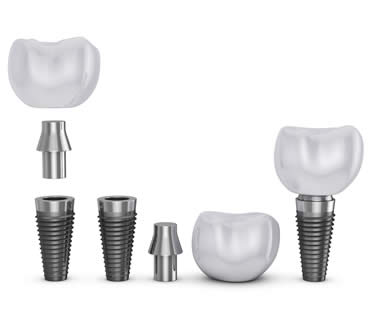
Dental implants are artificial teeth that mimic your natural tooth roots and are placed directly into your jawbone to provide optimal support for dental crowns, bridges and removable prosthodontics such as dentures. If you are considering dental implant therapy, please use the following guide to answer some of your questions.
- Am I a candidate for dental implant treatment? Dental implants can be used in healthy patients whose jawbones have completed growing and who have sufficient quality and quantity of jawbone to have a healthy implantation.
- Is dental implant treatment safe? Dentists agree that in healthy patients who are good candidates for the procedure, dental implants are low-risk.
- Will I be in a lot of pain during dental implant surgery? Dental implant surgery is typically performed as an outpatient procedure in your dentist’s office under local anesthesia.
- Does it take a long time to undergo the procedure? Treatment can generally be performed in under an hour, depending on the number of implants required.
- Is recovery painful? Healing from dental implant surgery is typically quick and easy for most healthy people. Any lingering pain can be treated with over-the-counter pain relievers.
- When will I get my new teeth? Implants must fuse to the bone in a process called ossification, a process that can take up to six months. In most cases, temporary teeth will be in place during this time period.
- How do I care for my dental implants? You will take care of your implants in the same way you would care for your natural teeth. Brush twice a day or after meals, especially before bedtime. Floss daily and continue to maintain regular dental appointments for checkups and preventative care.
- How long do dental implants last? Dental implants can last for twenty or thirty years if you care for them properly.
We treat patients from Baltimore and the surrounding area

Many patients seeking the stability and durability of dental implants wonder what the difference is between mini implants or standard sized dental implants. The basic differences are with regard to their intended function.
A standard dental implant is larger than 3 millimeters in diameter and is made up of two parts: the screw and the abutment. The screw portion of a dental implant is made of titanium, a non-toxic metal well tolerated by the body. The success of all dental implants is due to this bio-compatibility. Materials that aren’t tolerated by the body can create a response by the immune system and may lead to serious problems over time.
With a standard implant, the screw has two threaded areas: external, to screw into the bone and internal, to accommodate any components that are screwed into the implant for security. This internal area provides for the abutment. It is on this abutment that the tooth portion of a dental implant is attached. It also holds dentures firmly in place.
A mini dental implant is smaller than 3 millimeters in diameter and has one solid piece instead of screw and abutment. A mini implant has a solid screw body with a rounded ball shape that extends out of the jawbone. This rounded ball can hold a denture with a corresponding slot, keeping the restoration firmly in place.
Because they are smaller, mini implants provide less support than a standard implant. For example, four mini implants would be needed to hold a patient’s lower dentures in place securely. For the same job, only two standard sized implants would suffice.
Consult your dentist to determine if mini implants or standard implants are right to address your missing tooth or teeth. Get the right implant for your specific needs.
We treat patients from Baltimore and the surrounding area

Most people will eventually lose one or more teeth. Even with vigilant oral care, accident or injury can cause the loss of a tooth. As we age, simple daily wear can cause damage to your teeth resulting in tooth loss. More commonly, periodontal disease or tooth decay will cause you to lose one or more teeth.
While you may think one missing tooth, especially one that does not actually show, is not a problem, most dentists recommend immediately replacing a missing tooth. Missing teeth are not only unappealing aesthetically, but also cause problems with your bite and speech. More critically, missing teeth can cause a chain reaction that results in more missing teeth. Because teeth shift to fill the space created by the missing tooth, those teeth become loose and may eventually fall out.
Another problem caused by missing teeth is jaw bone loss. The pressure of tooth roots into the bone cells keeps them from dissolving. If the root is missing, the bone cells die and the bone disintegrates. The loss of jaw bone results in facial collapse, giving you a caved in and much older appearance. Bone loss also causes remaining teeth to become loose and fall out.
One of the best options for replacing lost teeth are dental implants. The placement of dental implants and tooth restorations can prevent the bone loss that results from missing teeth. Not only do dental implants restore the look of your natural teeth, they also provide the function and feel of your original teeth. Dental implants allow you to return to eating and speaking normally, and return your smile to its natural glory. To find out if dental implants are a viable solution to your missing teeth, contact your dentist for an examination and evaluation. With dental implants you can restore the look, feel and function of your natural smile.
We treat patients from Baltimore and the surrounding area

People are talking about dental implants. They’re talking about what a secure, longterm solution they are for patients with missing teeth and how successful they are for dental patients of all types. Are you wondering if you’re a candidate for dental implant treatment? The answer is yes, you probably are!
The one factor that’s a must for being a dental implant candidate is that you must have a missing tooth. The AAOMS (American Association of Oral and Maxillofacial Surgeons) estimates that as many as 70% of all adults have lost a minimum of one adult tooth. If you are among this group and you have a missing tooth, you’re a candidate for dental implants. Some patients are better suited to this particular treatment, however, so making an informed decision regarding your particular tooth replacement is vital.
The healthier you are, the more successful your dental implant surgery will be. Some health conditions and diseases should be strongly factored into whether or not dental implants are the best tooth replacement option. Patients with the following conditions may experience difficulty in the fusing of implant and bone:
- Smoking
- Cancer
- Radiation to the jaws or face
- Diabetes
- Drug or alcohol dependency
- Acute gum disease/periodontitis
Typically, a tooth is lost due to an accident, tooth decay, advanced gum disease or a failed root canal treatment. Even though the cause of the tooth’s loss might be through poor oral health, the healthier your mouth and surrounding teeth are, the more successful a dental implant will be.
Because the health of the bone is directly related to the strength of the fusion of the bone to implant, patients with healthier bones will have more successful experiences with dental implants. Maintain a diet high in calcium and other bone-nourishing nutrients and drink plenty of fluids.
We look forward to seeing you in our Baltimore dental office













